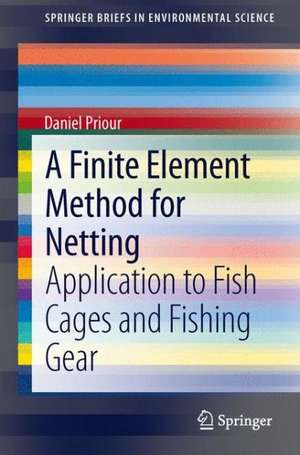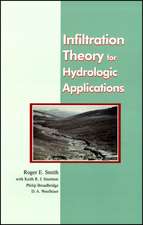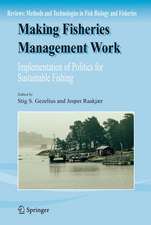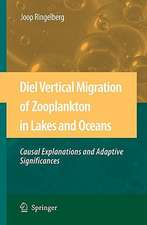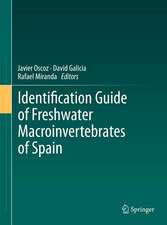A Finite Element Method for Netting: Application to fish cages and fishing gear: SpringerBriefs in Environmental Science
Autor Daniel Priouren Limba Engleză Paperback – 11 iun 2013
Din seria SpringerBriefs in Environmental Science
-
 Preț: 348.77 lei
Preț: 348.77 lei -
 Preț: 382.57 lei
Preț: 382.57 lei -
 Preț: 378.12 lei
Preț: 378.12 lei -
 Preț: 378.80 lei
Preț: 378.80 lei -
 Preț: 381.98 lei
Preț: 381.98 lei -
 Preț: 347.80 lei
Preț: 347.80 lei - 15%
 Preț: 464.18 lei
Preț: 464.18 lei -
 Preț: 378.12 lei
Preț: 378.12 lei -
 Preț: 377.53 lei
Preț: 377.53 lei -
 Preț: 379.09 lei
Preț: 379.09 lei -
 Preț: 381.00 lei
Preț: 381.00 lei -
 Preț: 383.93 lei
Preț: 383.93 lei -
 Preț: 175.58 lei
Preț: 175.58 lei -
 Preț: 475.83 lei
Preț: 475.83 lei -
 Preț: 380.07 lei
Preț: 380.07 lei -
 Preț: 378.92 lei
Preț: 378.92 lei -
 Preț: 411.93 lei
Preț: 411.93 lei -
 Preț: 375.62 lei
Preț: 375.62 lei -
 Preț: 375.45 lei
Preț: 375.45 lei -
 Preț: 378.92 lei
Preț: 378.92 lei -
 Preț: 377.57 lei
Preț: 377.57 lei -
 Preț: 377.35 lei
Preț: 377.35 lei -
 Preț: 378.34 lei
Preț: 378.34 lei -
 Preț: 344.67 lei
Preț: 344.67 lei -
 Preț: 374.30 lei
Preț: 374.30 lei -
 Preț: 362.43 lei
Preț: 362.43 lei -
 Preț: 446.26 lei
Preț: 446.26 lei - 5%
 Preț: 361.96 lei
Preț: 361.96 lei -
 Preț: 376.43 lei
Preț: 376.43 lei -
 Preț: 380.63 lei
Preț: 380.63 lei -
 Preț: 375.84 lei
Preț: 375.84 lei - 15%
 Preț: 463.20 lei
Preț: 463.20 lei -
 Preț: 383.33 lei
Preț: 383.33 lei -
 Preț: 375.23 lei
Preț: 375.23 lei -
 Preț: 377.57 lei
Preț: 377.57 lei -
 Preț: 381.59 lei
Preț: 381.59 lei -
 Preț: 379.48 lei
Preț: 379.48 lei -
 Preț: 376.04 lei
Preț: 376.04 lei -
 Preț: 413.84 lei
Preț: 413.84 lei -
 Preț: 381.81 lei
Preț: 381.81 lei -
 Preț: 352.28 lei
Preț: 352.28 lei -
 Preț: 381.81 lei
Preț: 381.81 lei -
 Preț: 381.98 lei
Preț: 381.98 lei - 5%
 Preț: 331.65 lei
Preț: 331.65 lei -
 Preț: 375.62 lei
Preț: 375.62 lei -
 Preț: 377.95 lei
Preț: 377.95 lei -
 Preț: 413.45 lei
Preț: 413.45 lei -
 Preț: 267.19 lei
Preț: 267.19 lei -
 Preț: 373.73 lei
Preț: 373.73 lei -
 Preț: 375.62 lei
Preț: 375.62 lei
Preț: 377.95 lei
Nou
Puncte Express: 567
Preț estimativ în valută:
72.32€ • 75.51$ • 59.72£
72.32€ • 75.51$ • 59.72£
Carte tipărită la comandă
Livrare economică 15-29 aprilie
Preluare comenzi: 021 569.72.76
Specificații
ISBN-13: 9789400768437
ISBN-10: 9400768435
Pagini: 130
Ilustrații: VII, 107 p. 52 illus., 30 illus. in color.
Dimensiuni: 155 x 235 x 17 mm
Greutate: 0.18 kg
Ediția:2013
Editura: SPRINGER NETHERLANDS
Colecția Springer
Seria SpringerBriefs in Environmental Science
Locul publicării:Dordrecht, Netherlands
ISBN-10: 9400768435
Pagini: 130
Ilustrații: VII, 107 p. 52 illus., 30 illus. in color.
Dimensiuni: 155 x 235 x 17 mm
Greutate: 0.18 kg
Ediția:2013
Editura: SPRINGER NETHERLANDS
Colecția Springer
Seria SpringerBriefs in Environmental Science
Locul publicării:Dordrecht, Netherlands
Public țintă
ResearchCuprins
1. Introduction.- 2. Finite element method.- 3. Equilibrium calculation.- 4. The triangular finite element for netting.- 5. The bar finite element for cable.- 6. The node element.- 7. Validation.
Notă biografică
Daniel Priour: Engineer, Research and Development, in Aquaculture and fishing technology at Ifremer. Experience in mechanical and hydrodynamic behaviour of marine structures such as fish farming cages and fishing gear. Development of Finite Element Model devoted to nettings and cables structures.
Textul de pe ultima copertă
This book fully describes a finite element method for netting. That describes the relation between forces and deformation of the netting. That takes into account forces due to the twine elasticity, the hydrodynamic forces, the catch effect, the mesh opening stiffness. This book is divided in 5 parts. The first section contains introduction on the finite element method, the second part is about equilibrium calculation, the third presents a triangular element for netting, the fourth and fifth are for cable and node element. The sixth presents few validation cases.
Caracteristici
A much needed complete overview on finite element method for netting structures Groups together and documents all main matter on the finite element method Includes clear examples and is richly illustrated
